
Expansion of the Flanders Festival, famous for early
music, into the field of contemporary music for the first time, 'with
a twist and an approach unlike anything you may already know' was a
Joint Venture in Antwerp. Seen&Heard
was privileged to be invited to be in on the beginning. Programming
of this inaugural festival (likely to become biennial) was entrusted
to Boudwijn Buckinx, a writer, former radio producer and composer
of '1001 sonatas for violin & piano' and 9 Unfinished symphonies',
with a brief that it should showcase the curator's own understanding
of 'beautiful and interesting music' and not be 'yet another small-scale
copy of your regular major new music festival with well known musicians
and sure-fire composers'.
Antwerp, far less well known for its tourist appeal
than Bruges, turns out to be a lovely city to explore, whether walking
the streets and riverside or exploring the numerous superb museums.
One of those, in the ancient Butcher's Hall, houses a special collection
of historical musical instruments; one can see Ruckers harpsichords
and a cathedral organ console played by Cesar Franck, then listen to
them on headphones. We were put up most comfortably in what is virtually
another museum, one not to be missed. The Centrum Elzenveld for the
arts, which served as the Festival's residential base, is a former convent.
Its attractively converted guest rooms surround peaceful cloister squares,
the corridors decorated with beautiful and interesting furniture and
artworks, old and new, the complex even boasting a tropical Botanical
Garden!
Although Joint Venture was given an English
title (and the local Antwerp Metro newspaper, very similar to
ours in London, had been printed in English in honour of the mini-Summit
meeting then being held in Ghent) the programme notes (accompanied by
a lengthy manifesto which appears to advocate pluralism together with
easy comprehension of the music by untutored audiences who may be nervous
of new music) were in Flemish only, making difficulties for foreign
critics. Boudwijn Buckinx's catholicity of taste ensured diversity and
surprising juxtapositions, and neither the organisers, nor S&H's
readers, would expect your reviewer to have been attuned to everything
heard. It was a festival to force a critic to confront his aesthetic
position.
It is evident that Boulez doesn't rule in Flanders
and, by and large, inscrutable composing systems were abjured. There
was to be heard a rich diet of 'New Consonant Music', which does not
quite equate with the new simplicity or Holy Simplicity (a description
which I coined in the early days of the for vogue for Pärt &
Gorecki in UK). For British readers, perhaps the best orientation for
some of the music which we found less than challenging, would be comparison
with the proclaimed populist ideals of the MasterPrize, which was won
at The Barbican by the most bland of the selected finalists, none of
whom could be described as challenging in the usual sense of that term.
But, as you will learn below, there are other types of challenge!
The diversity of ideas at play, sometimes in the same
concert, was intended to surprise the audience, without their becoming
'helplessly confused'. We missed some sessions because parts of three
days were spent commuting between Antwerp & Brussels in the hope
of becoming re-united with our luggage, from which we had been separated
when our Eurostar train was 'evacuated' twixt England and France, under
the very middle of the English Channel! With a mixture of misinformation
and guesses, from an organisation which appeared to be woefully lacking
in contingency plans, we too became 'helplessly confused' and gave up
the struggle, opting instead on the third day to remain in Antwerp,
re-equipping ourselves with necessaries to fulfil our commitment.
The musical events, including music theatre and jazz,
were held in venues all over the city, the smallest a solo guitar recital
in the chapel of the Centrum Elzenveld, the largest a full symphony
concert by the Kononklijk Filharmonisch Orkest van Vlaandeeren
in the grandest of several auditoria at the modern cultural centre deSingel.
The participating units in the festival were enabled
'to preserve their independence and show their true colours', and to
engage in 'a genuine, fruitful joint venture with the audience'.
A model lecture-recital was given by pianist Luk
Vaes, who is engaged on a book about extended techniques for the
piano. The first half was devoted to the modified instrument, with Cowell
(Manaunan Tides & Aeolian Harp), Kagel's demonic music
for Dracula, & a splendid dead-pan presentation of Cage's Water
Music ; the second to the English experimentalists around Cornelius
Cardew, represented by Howard Skempton and John White, finishing his
exposition by involving the audience in a Scratch Orchestra clapping
improvisation.
A loudly-amplified jazz/music theatre event, Monkey
trial by Frank Nuyts, to poems about suited men and zoo-apes
exchanging roles, had an original English text, which was supplied but
- typically in these trendy times - was unreadable in the atmospheric
dark, and was indecipherable aurally in Maï Nuyts' rendering of
her 'lead vocal' part!
A real gem, for us a high point of the week, was a
Satie event, his Genevieve de Brabant, opera pour marionettes (1899)
acted out by a group from Ghent, Theatre Taptoe, with panache and admirable
attention to detail, placing this best-selling cult composer in a context
which for me elevated, and made new sense of, his spare little piano
pieces. Acted and enunciated in Flemish, this international touring
show was easy to follow and enjoy (the pleasure completed with a bottle
of excellent 'Grand Theatre' vintage vin rouge at our table!). Available
also in French, it deserves to be seen in Britain.
Twelve new works were commissioned and a tower of strength
was the resident Hermes Ensemble of Antwerp, performing daily
music new to them, under the direction of Koen Kessels. A Canadian contingent
from Edmonton brought them a programme of well crafted pieces, several
of which harked back to former times; Polish-born Piotr Grella-Mozejko's
Voces Intimae in memoriam for Sibelius, and Jacek Sobieraj's
one from 1982 titled 'J S Bach in memoriam'. We missed Andrew
Creaghan's Transfigured Night (a Homage to Arnold Schoenberg)
and were disappointed by his The Transfigurations for solo guitar;
his straightforward literal transcriptions of Bach were pleasing, but
those of Mozart and Beethoven (Op 111 & 131 !) less suitable. Ernstalbrecht
Stiebler's For Boudewijn was a pared down study which brought
to mind Scelsi & Feldman; he acknowledged those links but explained
that his aim was for systematised music whereas theirs had been intuitive.
From several of the featured composers there was a
certain lack of surprise and risk, of allowing new music to take wing,
which troubled me during the week, and was epitomised by the contrast
in the final concert, when Ben Haemhouts roared onto stage on a super-bike
to divest his gear and bring Jan Sandstrom's Motorbike Concerto
(1989) to Flanders for the first time, after which the Koninklijk Filharmonisch
Orkest van Vlaamderen under Susana Malkki gave a confident account of
Schnittke's delightfully bitter-sweet and ironic Kein Sommernachtstraum
(1985) before winding up with the truly innovative, ground breaking
Symphony Nr 1 (1926) of the 18 year old Shostakovich. The strength and
originality of that student work gave us food for thought and reflection.
From the earlier 'straight' concerts I would mention,
for their memorable originality, two youthful works Two Pieces (1977)
and Under Neonlight 1 (1981) by Detlev Müller-Siemens
(b.1957) - the Beethoven Academie with I Solisti del Vento - and two
works by an impressive modern Dutch musical dynasty, with father and
two sons composers, in a particularly challenging concert by a superb
string ensemble from Austria, the Collegium Muiscum Carinthia, directed
by Alexei Kornienko. Antal Sporck (b.1981) gripped attention
for his Aurora, with lovely high, floating and rocking textures,
mostly quiet 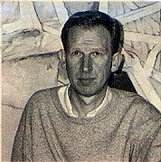 throughout,
a moment of disturbance accelerating to a pause, fugal passages starting
low on muted strings, moving upwards, a brief fierce eruption, exciting
because so long delayed, leading to a coda. His father Jo Sporck
(b.1953) [photo, left],
father of a family Joint Venture - Antal's brother also composes! -
was represented by Space 1 (1999), ideally intended for spatial
presentation, but without that possible distraction very acceptable
in normal platform performance. After a jagged, arresting start which
conveyed energy and tension, there were dialogues between duos of violins,
cellos and violas successively. There was an engrossing and rather disturbing
Ballade for violin (Elena Denisova) & orchestra, in a dense,
post-Bergian manner, by Franz Hummel (b.1939) but the real challenge
came with two New York composers of unapologetic romantic music. I found
Michael Sahl's Ballads & Grooves for string orchestra (2000)
blander than early Tippett and less adventurous than, say, Bartok's
Divertimento. The premiere of Beth Anderson's Three Swales was
staggering, an over-the-top, exuberant set of flamboyant pieces in a
post-Dvorak vein, played for all they were worth with collective virtuosity
and much adored by the audience. In a programme note about this composer,
in connection with her text Beauty is Revolution, Michael Sahl
applauds Beth Anderson's 'conspiracy to commit beauty'. Three Swales
was 'beautiful music' with a vengeance!
throughout,
a moment of disturbance accelerating to a pause, fugal passages starting
low on muted strings, moving upwards, a brief fierce eruption, exciting
because so long delayed, leading to a coda. His father Jo Sporck
(b.1953) [photo, left],
father of a family Joint Venture - Antal's brother also composes! -
was represented by Space 1 (1999), ideally intended for spatial
presentation, but without that possible distraction very acceptable
in normal platform performance. After a jagged, arresting start which
conveyed energy and tension, there were dialogues between duos of violins,
cellos and violas successively. There was an engrossing and rather disturbing
Ballade for violin (Elena Denisova) & orchestra, in a dense,
post-Bergian manner, by Franz Hummel (b.1939) but the real challenge
came with two New York composers of unapologetic romantic music. I found
Michael Sahl's Ballads & Grooves for string orchestra (2000)
blander than early Tippett and less adventurous than, say, Bartok's
Divertimento. The premiere of Beth Anderson's Three Swales was
staggering, an over-the-top, exuberant set of flamboyant pieces in a
post-Dvorak vein, played for all they were worth with collective virtuosity
and much adored by the audience. In a programme note about this composer,
in connection with her text Beauty is Revolution, Michael Sahl
applauds Beth Anderson's 'conspiracy to commit beauty'. Three Swales
was 'beautiful music' with a vengeance!
A generous number of CDs were presented to Seen&Heard
at Antwerp and enquiries about them from readers will be welcomed.
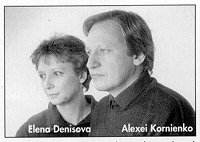
Extremely desirable, all six of them to be warmly recommended, are those
involving violinist Elena Denisova and her pianist/conductor husband
Alexei Kornienko, who have trawled interesting unusual repertoire
and deliver well-recorded performances of superb accomplishment and attention
to detail; those gifted musicians should be invited to perform in UK urgently!
Denisova is a top, world class player, but her husband
too shows himself equally a perceptive 'pianists' pianist' and a far
from reticent chamber music partner - not an accompanist who would be
content to have his piano lid on the 'short stick'! Together, they have
a great hit with a programme of Miniatures for Violin & Piano arranged
by Jascha Heifetz, Arte Nova 74321 72124-2
[review]
, played on both instruments with easy, relaxed musicality,
subsuming virtuosity but without drawing it to forward attention. We
played it straight through with pleasure in the sequence, which is by
no means one of mostly 'show off' pieces. Gorgeous!
Rapport and balance are notably good there and equally so
on ORF Extraplatte EX 408-2 Solisten
im Trio Schnittke, Kollontaj, Fheodoroff & Buckinx (with cellist
Josef Podhoransky) and in seven works by Jo Sporck on
Et'Cetera KTC 1234 (Denisova & Kornienko with a different
cellist, Grigori Alumian) This composer portrait CD includes Space
1(heard in Antwerp), and he is now fixed firmly in my mind as an
accomplished and individual Netherlands composer.
On her solo CD, Et'Cetera
KTC 1236, Elena Denisova gives a fine, fully competitive
account of the Bach D minor Partita (with Chaconne) and couples it with
a major 35 mins. unaccompanied Partita Testament by Mikhail Kollontaj,
which is related to the events of Golgotha in terms of a Russian-Orthodox-Church
interpretation. She plays music for violin and organ by Rheinberger
on Arte Nova 74321 58965-2, Six
pieces Op 150 and Suite Op. 166, unusual novelties. She can be heard
as soloist, concertmaster and as leader of the National Quartet of Moscow,
with the Collegium Musicum Carinthia, conducted by Alexei Kornienko,
as they were at Antwerp, in Hemera HCD 2926,
a CD of Musica Concertante from the Trondheim Composers Group by Albertsen,
Kleiberg, Bottcher & Bjorklund.
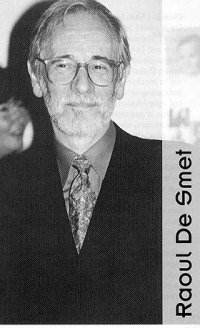
Both Bowdewijn Buckinx and Raoul De Smet
are leading figures in Flemish contemporary music. De Smet (b. 1936)
is an Antwerp composer very active in the City's musical life. He organises
there the International Orpheus Prize competition of New Music from
Flanders, founded in 1985 and devoted by regulation to performances
of music composed in the last 30 years, 'an insurance of its constant
updating', to ensure candidates will be well acquainted with modern
repertoire and recent trends. A CD of works from the competitions broadcast
in 1991 & 1994 confirms an open minded and forward looking approach.
Goeyvaerts 25th
Gulbenkian Encounters of Contemporary Music Lisbon,
21 May-3 June 2001 is the only name you are likely to know; his
De Zeven Zagels is well worth knowing and well played here by
the Rubio Quartet. Buckinx is represented with a cello-piano piece and
De Smet himself by Gnomos III for saxophone quartet. Other works
in a varied and thoroughly enjoyable mixed programme include Three
Slovak Dances by Janpieter Biesemans for recorders - the contemporary
recorder flourishes in the Low Countries. I have also from Antwerp a
superlative demo CD by a very classy recorder quartet, Apsara,
four young women who ring the changes on all the possibilities developed
with extended techniques for this once-humble domestic instrument -
apsara@skynet.be
. Buckinx has a newly released CD of his own 'consonant music'
on Gents Muzikaal Archief Vol 15
- signum@Pandora.be
- with three piano trios, and 6 piano pieces entitled Short Lived
#1-6 which caused a stir in the mid-'80s, because their 'exposed
perfect triads' were so unfashionable then. De Smets' Meditations,
Dialogues and Reminiscences on Digi
Classics DC 98 087032 leave me in no doubt that he too is
an independent, up to date musical thinker, whose name and music ought
to have crossed the North Sea, eclectic in attitude and not too beholden
to any academic persuasion, though well familiar with them all. I look
forward to covering the Orpheus Prize competition next year.
A sensational discovery is Phaedra
92023 In Flanders Fields Vol. 23 (!), music for trombone
(solo, quintet and with electronics), a tribute to trombonist Leo Verheyen's
'uncompromising tenacity' in promoting new music of the younger generations.
I have long promoted my own belief that the trombone is one of the instruments
whose potential for serious contemporary music is least appreciated
(my son was a trombonist in the NYO and played Berio's trombone Sequenza
for his graduation recital). Here you have a demonstration that a trombone
quintet can be as satisfying a combination as the cello octet, a medium
which is now well established in the Netherlands
and in Finland.
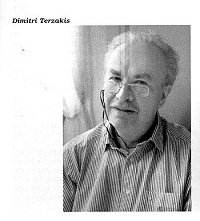
Beth Anderson kindly gave me a CD of her music including a Piano Concerto
and several Swales, even though she knew that her idiom is not
my 'cup of tea', just as she confessed that Schnittke is not hers! (beand@interport.net)
Finally, another 'melodist', Dimitri Terzakis (b.1938, Athens).
I was told repeatedly that missing his Erotikon and Oktoechos
on the first day on account of the Eurostar fiasco was a particular
cause for regret, and how right that has proven! Today, just in the
nick of time, just as I was about to send this report off for posting
on line, a CD of his music, CPO 999 572-2,
reached me by post. We played it straight through and have been bowled
over by the force and passion of the totally original music. Having
listened to 78 minutes of his music dating from 1972 to 1989, I would
unhesitatingly describe Dimitri Terzakis as a composer we cannot
afford not to know. The productions, all excellently recorded, are by
WDR and famous musicians involved include Halina Lukomska and Sachko
Gawriloff amongst many others. Terzakis is a former pupil of Zimmermann
who now lives in Germany, taps historical roots from his native Greece
(it is hard to get on as a contemporary composer in Greece!) and intuitively
incorporates elements from microintervallic French spectral music and
Southeastern Europe and Mediterranean monophony and heterophony. This
CD, one of my discoveries of the year, even though produced back in
1998, has two string quartets, song to texts and ohne Worte,
with varied accompaniments including cimbalom, and finishes with Oktoechos
(1989) for the same ensemble as Schubert's Octet. If we had not been
to Flanders, I might never have encountered Terzakis. Do buy it!
Peter Grahame Woolf
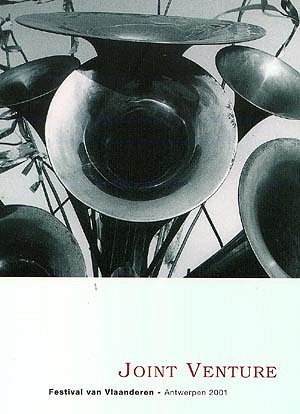

 Return to:
Music on the Web
Return to:
Music on the Web